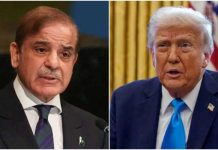———— Islamabad does not believe in ‘perpetual hostility’ with New Delhi, says Dar
———— Urges the BJP-led govt to do a ‘sober reflection’ on future of ties
———— Asserts Pakistan always sought ‘good neighbourly relations’ with India
———— Avers Pakistan would never agree to unilateral approaches
———— Highlights Pakistan’s commitment to regional connectivity and economic development
By Asghar Ali Mubarak
ISLAMABAD: Pakistan on Tuesday said it does not believe in “perpetual hostility” with India, urging the BJP-led government to do a “sober reflection” on the future of ties between the two nuclear-armed neighbours.
In a policy statement delivered at the Institute of Strategic Studies Islamabad (ISSI), Deputy Prime Minister and Foreign Minister Ishaq Dar said Pakistan always sought “good neighbourly relations” with India.
“To our east, the relationship with India has historically remained troubled. Pakistan does not believe in perpetual hostility. We seek good-neighbourly relations with India on the basis of mutual respect, sovereign equality, and a just and peaceful resolution of the long-standing Jammu and Kashmir dis-pute.” Dar said.
He said while Pakistan had always been receptive to constructive engagement through dialogue that includes all outstanding issues, Pakistan would never agree to unilateral approaches or attempts to impose India’s will or hegemony.
“We will also take every step needed to maintain strategic stability in South Asia and would respond effectively and decisively to any ill-considered military misadventure by the ‘Hindutva’ driven dispen-sation in New Delhi,” he added.
“In our view, as the BJP-led NDA government starts a new term, it is time for a sober reflection on the future of India-Pakistan relations and the cross-cutting issues affecting the entire region,” the foreign minister further said.
He said India’s illegal and unilateral actions of 5 August 2019 had adversely affected the environment of bilateral relations. “The onus remains on India to take necessary steps to create an enabling envi-ronment for purposeful engagement and result-oriented dialogue on all issues,” Dar stressed.
“In this context, it is equally important that India eschews its relentless smear campaign against Paki-stan, desists from its state-sponsorship of terrorism and extrajudicial killings inside Pakistan, and takes tangible steps to move the relationship in a positive direction.”
“South Asia is home to more than one-fifth of humanity. The region is beset by daunting challenges including poverty, unemployment, illiteracy, disease, food insecurity, water scarcity, natural disasters, environmental degradation, and effects of climate change,” he further said.
“Rather than fight with each other, it would be prudent for the South Asian nations to combat these challenges. We are not only the least economically integrated region, but also one with the lowest rankings on almost all indices of human development.”
He said the South Asian Association for Regional Cooperation (SAARC), the only viable platform for re-gional cooperation and tackling these myriad challenges, remains stymied due to obstinacy of one member state.
“The political leadership in South Asia owes it to its peoples and future generations to act with pru-dence and turn a new page in regional relations and mutual cooperation,” he maintained.
He said Pakistan’s approach was conceptualised in the “peaceful neighbourhood” policy. In essence, it seeks the creation of a peaceful external environment so that our core national objective of sustaina-ble economic development could be assiduously advanced.
As such, Pakistan remains a strong proponent of the inextricable link between peace and develop-ment, he remarked.
Within this framework, he said Pakistan has consistently strived to have peaceful, cooperative and good-neighbourly relations with all countries in our immediate and extended neighbourhoods. De-spite challenges and even setbacks in certain instances, Pakistan’s approach remains steadfast.
“A peaceful, stable, united, and prosperous Afghanistan is in Pakistan’s vital interest. There are no other two countries in the world that share so much as Pakistan and Afghanistan do – from history and geography to faith and culture to language and literature to cuisine and music,” according to Dar.
He said since the Taliban takeover in August 2021, Pakistan has followed a pragmatic approach – fo-cused on practical cooperation aimed at averting any humanitarian crisis in Afghanistan and facilitating the well-being of the 40 million Afghan people.
“Pakistan has also prioritised regional cooperation to ensure that our actions remain in sync with the broader international community. Apart from emphasising inclusive governance and respect for the rights of all Afghans, Pakistan stresses the imperative need to ensure that Afghanistan’s soil is not used for terrorism against any state,” he said.
He said Pakistan earnestly hoped the Afghan Interim authorities would see that it is in their own en-lightened self-interest to heed this call and take the practical steps needed to address our serious con-cerns.
“If the vision of a peaceful and stable Afghanistan is realised, the fruits of economic cooperation, re-gional integration, and connectivity would be enormous. Not only the Afghan people will benefit tre-mendously but also the dividends of shared prosperity would extend to Central Asia and beyond.”
Within the neighbourhood, he said Pakistan has its most trusted and reliable friend, China. “Our all-weather strategic cooperative partnership with China is the cornerstone of Pakistan’s foreign policy.”
“It is also a factor of stability in the region and beyond. The China Pakistan Economic Corridor is a trans-formational project contributing both to Pakistan’s economic turnaround as well as regional prosperi-ty.”
Dar said the Prime Minister’s recent visit to China and his deep consultations with the Chinese leader-ship have resulted in reaffirming the strategic importance the two countries attach to this relationship and to the pivotal role of CPEC.
“Upon successful completion of 10 years of CPEC, we have jointly agreed to pursue its upgraded ver-sion in the coming years. Essentially, our focus would be on industrialisation, digitalisation, green tran-sition, agriculture, and people-to-people exchanges.”
“We will do everything possible to ensure safety and security of Chinese personnel and projects in Pa-kistan and to safeguard CPEC against the machinations of inimical forces. The Pakistan-China relation-ship would continue to stand tall and serve the best interests of our two nations,” he insisted.
Earlier, Deputy Prime Minister and Foreign Minister Ishaq Dar has said that a peaceful, stable Afghani-stan would benefit both countries and promote prosperity in Central Asia and beyond.
Speaking at the Institute of Strategic Studies Islamabad on Tuesday, he highlighted the importance of dialogue, the avoidance of bloc politics, and adherence to the UN Charter.
He emphasised Pakistan’s commitment to maintaining peaceful, cooperative, and good neighborly relations with all countries, despite facing challenges and setbacks in certain instances. Dar stressed Pakistan’s focus on economic development and regional peace, particularly with Afghanistan and In-dia, advocating for stability in South Asia.
He highlighted Pakistan’s cooperation with Afghanistan since the Taliban takeover in August 2021 to avert a humanitarian crisis and support the Afghan people. He further maintained that Afghan soil must not be used for terrorism against any state and urged Afghan authorities to address its concerns.
The foreign minister expressed Pakistan’s desire for good relations with India based on mutual re-spect, sovereign equality, and a peaceful resolution of the Jammu and Kashmir dispute, rejecting uni-lateral approaches or attempts at hegemony.
“We will maintain strategic stability in South Asia and respond decisively to any ill-considered military actions by the Hindutva-driven government in New Delhi,” he added.
Regarding the new term of the BJP-led NDA government in India, Dar called for reflection on India-Pakistan relations and regional issues. He criticised India’s unilateral actions on August 5, 2019, in Indian Illegally Occupied Jammu and Kashmir, stating they harmed bilateral relations.
Deputy PM urged India to create an environment conducive to meaningful dialogue, end its smear campaign, cease state-sponsored terrorism in Pakistan, and take concrete steps for positive relations.
He noted that South Asian nations must address poverty and low human development rankings and lamented the stalled progress of the South Asian Association for Regional Cooperation due to one member state’s obstinacy.
Dar further stated Pakistan’s strategic partnership with China is pivotal to its foreign policy, highlighting the transformative impact of the China-Pakistan Economic Corridor (CPEC) on Pakistan’s economy and regional prosperity.
He mentioned Prime Minister Shehbaz Sharif’s recent visit to China, reaffirming the strategic im-portance both countries place on CPEC.
Upon completing ten years of CPEC, Pakistan plans to pursue an upgraded version focusing on indus-trialisation, digitalisation, green initiatives, agriculture, and people-to-people exchanges, ensuring the safety of Chinese personnel and projects, he added.
The foreign minister also underscored Pakistan’s strong strategic partnership with China, its desire for deeper ties with neighboring and major powers, and its commitment to multilateralism. The overarch-ing goal was to enhance regional connectivity and economic security through a pivot to geo-economics, he added.
Despite challenges, Dar reiterated Pakistan’s steadfastness and stressed the importance of communi-cation, dialogue, and negotiations to mitigate risks.
He advocated for a collaborative approach that respected all nations’ interests and aspirations, reject-ing bloc politics and endorsing cooperation over confrontation. He noted global transformations led by leaders like Xi Jinping and Olaf Scholz, marking a shift towards a multipolar world order.
“We are living in an increasingly tumultuous and dangerous world, with traditional and new security threats,” he said, adding that Pakistan’s approach focused on a peaceful neighborhood policy and sus-tainable economic development, emphasising the link between peace and development.
Deputy PM stressed that a peaceful, stable, united, and prosperous Afghanistan was in Pakistan’s in-terest due to shared history, geography, culture, and music.
He mentioned that Pakistan aims for deeper partnerships with Iran, Gulf nations, Turkey, Central Asian states, and Azerbaijan, prioritizing trade, investment, and regional connectivity through the Special Investment Facilitation Council.
Maintaining stable relations with the United States and fostering ties with major powers like Russia, the European Union, Japan, and ASEAN are crucial for enhancing Pakistan’s economic security amid global geopolitics, he added.
The foreign minister stated that Pakistan’s upcoming UN Security Council membership for 2025-26 un-derscores its commitment to international peace and security.




